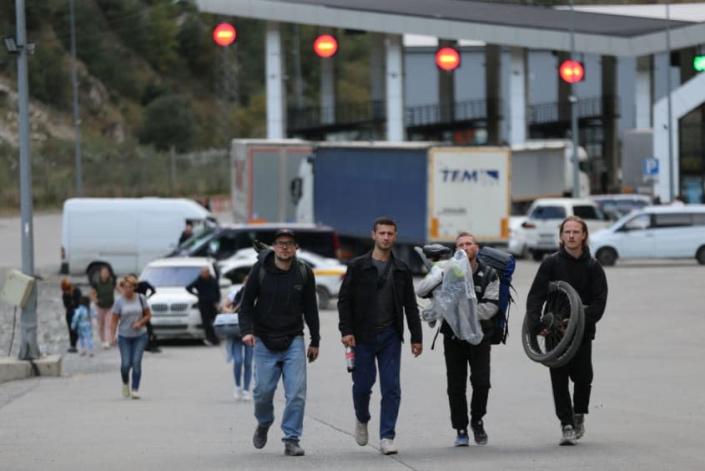
In the seven days since Russian President Vladimir Putin “announced the ‘partial mobilization‘ there has been a considerable exodus of Russians seeking to evade call-up,” Britain’s Ministry of Defense said in its early Thursday intelligence assessment. The exact number of fleeing Russians is “unclear,” but “it likely exceeds the size of the total invasion force Russia fielded in February 2022.”
Those trying to leave Russia tend to be “better off and well educated,” Britain’s Defense Ministry said, and combined with the hundreds of thousands of reservists being mobilized, “the domestic economic impact of reduced availability of labor and the acceleration of ‘brain drain’ is likely to become increasingly significant.”
“Mobilization is another serious hit on the Russian economy” as “oil and gas revenues are beginning to dry up” amid plunging energy prices, Maxim Mironov, a finance professor at Madrid’s IE Business School, tells The Wall Street Journal. “People are escaping where they can,” he added. “These are mainly highly skilled, educated workers. So this mobilization is going to have a severe economic effect not just for the next year but for decades.”
Russia started running a budget deficit last month, and training, equipping, and paying 300,000 conscripts requires a lot of money, the Journal adds. And “the Kremlin has dispatched still more forces” to Russia’s borders, where FSB agents confront and in some cases stop “young Russian men trying to join an exodus out of the country,” The New York Times reports. “While many Russians headed for the borders, others took to the streets,” and “still others have attempted sabotage” at military recruitment centers.
Putin’s “partial mobilization” was supposed to apply “only to those with military experience, but across Russia — and especially in remote areas and among ethnic minority groups — there were numerous reports of people with no experience being swept up,” the Times reports. In fact, the Institute for the Study of War adds, “Russian military recruitment officials are openly contradicting the Kremlin’s publicly stated guidelines for mobilization to meet quota requirements.”
And Russian authorities “continue to send newly mobilized and undertrained recruits to directly reinforce severely degraded remnants of various units” in Ukraine, ISW reports. The Ukrainian military’s general staff said Wednesday night that Russia’s new conscripts are arriving on the front lines in Donetsk, crashing tanks and unclear how to use the armored vehicles’ weapons.
You may also like
The most shocking claims from the newest books about Trump’s presidency




